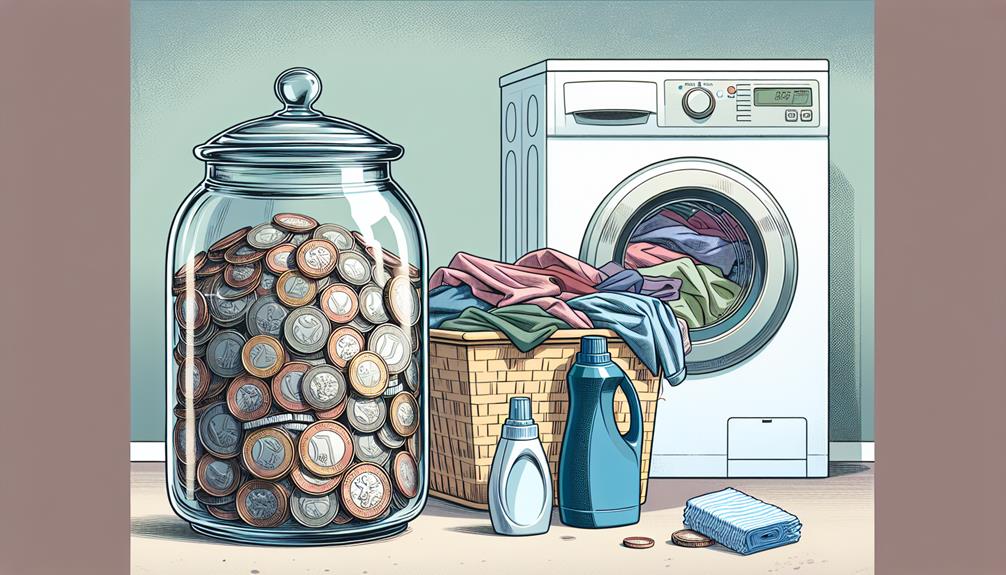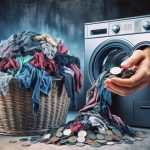Did you know that the average American family spends around $600 per year on laundry expenses alone? It's something we all do, but have you ever really stopped to think about how much it costs to keep those clothes clean and fresh?
From detergent to electricity, the costs can add up quickly. But there's more to it than just the price tag on a bottle of detergent. Stay tuned to discover the breakdown of laundry costs and some tips on how to save money in the long run.
Table of Contents
Key Takeaways
- Choosing energy-efficient appliances saves on electricity costs.
- Bulk purchases and store-brand options reduce laundry supply expenses.
- Air-drying clothes minimizes dryer usage for long-term savings.
- Opting for cost-effective detergents and DIY alternatives lowers laundry costs.
Average Cost of Laundry Detergent
When I shop for laundry detergent at the store, I often notice the varying prices and ponder what the average cost is per load. Making a brand comparison can help determine the most cost-effective option. Some brands may seem pricier upfront but could actually be more economical in the long run because you need to use less detergent per load.
Another aspect to contemplate is the environmental impact. Certain detergents are designed to be more environmentally friendly, using biodegradable ingredients or coming in recyclable packaging. While these options may have a slightly higher price tag, they contribute to reducing harm to the environment.
Electricity Usage for Washing Machines
As I run my washing machine, I'm mindful of the electricity it consumes with each cycle. Being energy efficient is key to not only reducing my utility bills but also minimizing my environmental impact.
Here are some important points to take into account:
- Energy Efficiency: Opt for washing machines with high energy efficiency ratings to lower electricity consumption.
- Load Size: Washing full loads rather than smaller ones can maximize energy usage efficiency.
- Quick Wash Option: Utilize quick wash cycles for lightly soiled clothes to save energy.
- Cold Wash: Washing clothes in cold water instead of hot can significantly reduce electricity usage.
- Regular Maintenance: Keeping the washing machine clean and well-maintained makes sure it operates efficiently, consuming less electricity.
Water Consumption for Laundry
Minimizing water usage during laundry is essential for both saving resources and reducing utility costs. Implementing water conservation strategies not only helps the environment but also leads to significant cost savings. One effective way to reduce water consumption is by using energy-efficient appliances. These appliances are designed to optimize water usage while maintaining high washing performance, ultimately cutting down on both water and energy expenses.
Let's break down the impact of water consumption during laundry with a simple table:
| Water Consumption Strategies | Benefits |
|---|---|
| Use cold water settings | – Saves energy by not heating water <br> – Preserves fabric colors |
| Wash full loads | – Maximizes efficiency <br> – Reduces water waste |
| Upgrade to a high-efficiency washer | – Uses less water per cycle <br> – Lowers utility bills |
Cost of Fabric Softener and Dryer Sheets
Let's now shift our focus to the expenses associated with using fabric softener and dryer sheets in your laundry routine. When considering the cost of fabric softener and dryer sheets, there are a few things to keep in mind:
- Fabric Softener Alternatives: Explore using white vinegar or baking soda as natural alternatives to commercial fabric softeners. These options are often more cost-effective and environmentally friendly.
- Dryer Sheet Effectiveness: While dryer sheets can be convenient, consider using wool dryer balls instead. They're reusable and can help reduce drying time, ultimately saving you money.
- Bulk Purchases: Buying fabric softener and dryer sheets in bulk quantities can often lead to cost savings per unit.
- Store Brands vs. Name Brands: Compare prices between store-brand fabric softeners and dryer sheets with name-brand products to find the most cost-effective option.
- DIY Options: Consider making your own fabric softener or dryer sheets using simple household ingredients like essential oils or vinegar to save money in the long run.
Impact of Load Size on Expenses
Understanding how load size impacts your laundry expenses is essential for managing your budget effectively. Load efficiency plays a significant role in determining how much you spend on each laundry cycle. Let's break down the cost based on load size:
| Load Size | Average Cost | Cost per Item |
|---|---|---|
| Small | $1.50 | $0.25 |
| Medium | $2.50 | $0.20 |
| Large | $3.50 | $0.15 |
| Extra Large | $4.50 | $0.10 |
| Jumbo | $5.50 | $0.05 |
As the table illustrates, the larger the load size, the more cost-efficient each item becomes. This cost breakdown highlights the importance of maximizing your load size to save money in the long run. By being mindful of the load efficiency, you can effectively manage your laundry expenses without compromising on cleanliness.
Expenses Associated With Dry Cleaning
When I think about the costs associated with dry cleaning, it's important to factor in the frequency of this service and its impact on my overall budget. Dry cleaning can add up quickly, so it's crucial to take some alternatives and DIY techniques to save money.
- Frequency Matters: The more frequently I send items to be dry cleaned, the more it will impact my budget.
- Cost Per Item: Different items have varying dry cleaning costs, so understanding these costs can help manage expenses.
- Bulk Discounts: Some dry cleaners offer discounts for bulk items, so it's worth inquiring about these options.
- Dry Cleaning Alternatives: Exploring options like steam cleaning or spot treatments can be more budget-friendly.
- DIY Techniques: Learning how to use at-home dry cleaning kits or techniques can considerably reduce expenses.
Maintenance Costs for Appliances
Maintaining appliances involves regular upkeep and occasional repairs, which contribute to the overall cost of ownership. It's crucial to take into account the lifespan of your appliances when factoring in maintenance costs. Typically, washers last around 10-14 years, while dryers have a similar lifespan. However, these numbers can vary based on usage, brand, and maintenance practices.
Repair expenses are another aspect to keep in mind. Sometimes appliances break down unexpectedly, requiring immediate attention. These repair costs can add up over time, impacting your laundry budget. To mitigate these expenses, consider investing in newer, energy-efficient appliances that often come with warranties covering repairs for a certain period.
To make the most of your appliances and extend their lifespan, follow the manufacturer's maintenance recommendations. Regular cleaning, checking for leaks or unusual noises, and promptly addressing any issues can help prevent costly repairs. By being proactive and taking care of your appliances, you can minimize repair expenses and make sure they last for years to come.
Ways to Save Money on Laundry
Looking for ways to cut down on laundry costs? Here are some practical tips to help you save money on your laundry routine:
- DIY Detergents: Making your own laundry detergent can be a cost-effective alternative to store-bought brands. Simple ingredients like baking soda, washing soda, and Castile soap can create an effective cleaning solution for your clothes without breaking the bank.
- Air Drying Techniques: Opting to air dry your clothes instead of using a dryer can considerably reduce your energy consumption and utility bills. Hanging your clothes on a clothesline or drying rack not only saves money but also helps extend the lifespan of your garments.
- Wash Full Loads: Wait until you have a full load of laundry before running the washer. This maximizes the efficiency of each cycle and reduces water and electricity usage.
- Use Cold Water: Washing your clothes in cold water instead of hot or warm water can save on energy costs. Most laundry detergents work just as effectively in cold water, so you won't sacrifice cleanliness.
- Proper Maintenance: Regularly clean your washing machine and dryer to ensure they're working efficiently. Removing lint from the dryer filter and cleaning the washing machine can prevent costly repairs and prolong the lifespan of your appliances.
Frequently Asked Questions
Is It Cheaper to Do Laundry at Home or Use a Laundromat?
When comparing budget, doing laundry at home is usually cheaper than using a laundromat. However, laundromats can save time with multiple machines available. Consider your priorities – saving money at home or saving time at the laundromat.
How Often Should I Clean My Washing Machine to Maintain Its Efficiency?
To maintain my washing machine's efficiency, I clean it regularly. Recommendations suggest cleaning every 1-3 months. By doing this, I guarantee peak performance and longevity for my appliance, making laundry chores easier and more effective.
Are There Any Eco-Friendly Laundry Products That Are Cost-Effective?
Absolutely, I've found some amazing sustainable options for green laundry. They're not only eco-friendly, but also budget-friendly solutions. I've managed to keep my laundry routine affordable while reducing my environmental impact.
What Are Some Common Mistakes That Can Drive up Laundry Costs?
Using the wrong drying methods, like always opting for the dryer over air-drying, can drive up laundry costs. Neglecting proper fabric care, such as washing delicates with heavy items, can also lead to unnecessary expenses.
How Can I Calculate the Overall Cost of Doing Laundry, Including Water and Electricity Expenses?
To figure out the total laundry cost, consider water and electricity expenses. Compare costs for different machines and opt for energy-efficient options. This way, you can save money and be more eco-friendly in the long run.
- Why Is Red Velvet Not Red? - April 25, 2024
- How Do You Describe Velvet Fabric? - April 25, 2024
- How Strong Is Velvet? - April 25, 2024







